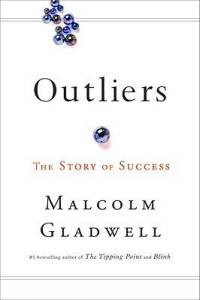A friend once calculated that since the card costs $20 bucks per year and entitles you to a 10% discount, you'd have to spend more than $200 a year on books to "earn" back the cost of the card.
Well, I think I've hit it in the first two months of 2009.
Among the many books I've picked up at half price is a really interesting one from Malcom Gladwell. If you find his name somewhat familiar, it's because he also wrote "The Tipping Point" and "Blink", both best sellers on the NYT list (the only book list I reference).
Here's what it looks like:

If you liked books such as The Tipping Point, Freakonomics, The Undercover Economist, etc. You'll definitely find Outliers fascinating. I love how these authors put on their psuedo social-scientist hats and explain social phenomena.
That's the common thread among all these books: they see that something's different (phenomena), that it happens fairly frequently (trend), and they ask why?
We don't ask why enough.
Before I get too deep into that, here's a quick look at the book:
What I learnt from the book:
- The system is not a fair deck - e.g. In professional sports, where players get spotted when they're really young, the odds are stacked against you if you're born in the later half of the year. Reason given by Gladwell is that physical difference is magnified at that young age.
http://en.wikipedia.org/wiki/England_national_under-21_football_team
Let's break the first team's birth dates down:
Number born in first half: 7/19
pffffffffffft.
On a whim, I also checked out Singapore's football team.
http://en.wikipedia.org/wiki/Singapore_national_football_team
Number born in first half: 13/22
So, either Singapore's scouts are doing such an excellent job that they're snapping up talent once they hit the age-groups and grooming them for national glory...
or the theory's slightly wonky. (Granted, it's probably not representative, but still...)
- Your lot in life has been cast before (or more accurately, when) you were born. Being exceptionally talented means nothing if you are in a roomfull of exceptionally talented people. Take for example someone like Bill Gates in 1980 vs. the same dude in 2009 - he'd have to be waaaaay smarter to have the kind of success he did. Essentially, he was an expert when the revolution was just beginning.
Having a solid 5 - 7 years of digital PR experience in a couple of year's time is gonna make some people very rich.
- 10,000 hours to master a skill/area of expertise. No way around it, he's just saying what we knew all along: the champions are those who wanted it more.
That means we need to spend at least 5 plus years in the industry - any industry with regular office hours - to even come close to being an "expert". That's not even discounting the days where you kinda zone out through the day. Damn.
Well, either that or spend way more time per day cramming those extra hours, haha.
- You only need to be smart enough. That's right. Gladwell points out that smarts/talents/aptitude/any other term for God-given gifts basically qualify you to be put in the elite brackets; having the highest IQ points does not make you the most successful or sought-after person around...though you could be, if you also had the good fortune of being born at the right time and the passion to spend 10,000 hours at it.
----
Obviously, I enjoyed the book tremendously. So let me know if you'd like to borrow it, I'll be happy to loan it to you. :)



No comments:
Post a Comment